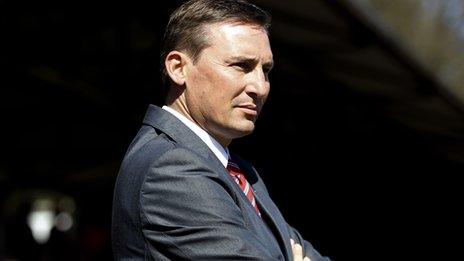FA Cup: Portsmouth and Aldershot meet on Remembrance Sunday
- Published
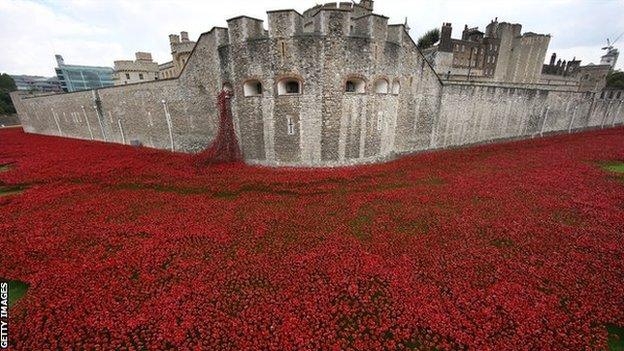
The moat at the Tower of London has been filled with 888,246 ceramic poppies to commemorate every British military fatality during the course of the First World War
FA Cup first round: Portsmouth v Aldershot Town |
|---|
Venue: Fratton Park Date: Sunday, 9 November Kick-off: 14:00 GMT |
Coverage: Live commentary on BBC Radio Solent, BBC Surrey and online; Final Score and live text commentary on BBC Sport website. Highlights on BBC Two on Sunday at 18:30 GMT |
"It's almost written in the stars that these two teams with such military history are coming together on this Remembrance Sunday. We have the home of the Royal Navy playing the home of the British army, so it is fitting it is being played this weekend." Bob Beech, Portsmouth fan and historian.
The military is etched into the very foundations of both Portsmouth and Aldershot.
Former Portsmouth manager Alan Ball summed up the place perfectly when he said: "It's a tough, street-fighting city and they send people to war from here." The home of the Royal Navy, Portsmouth also provided ground troops for World War One.
Aldershot, the garrison town home of the British army, provided the base from which the British Expeditionary Force (BEF) left in August 1914. Aldershot Command contained 20% of the country's entire home force at the outbreak of war.
This Remembrance Sunday marks the 100-year anniversary of the War and also pits Portsmouth against Aldershot in the first round of the FA Cup.
Each side has given 225 tickets to serving navy or army personnel, while a further 50 have been distributed to veterans and cadets via the Royal British Legion.
BBC Sport explores the historic links between the armed forces and Portsmouth and Aldershot.
The Pompey Pals
The Pompey Pals were the 14th and 15th Battalions of the Hampshire regiment. More than 3,000 men would join up in 1914 and 1915. Half that number were recruited at Fratton Park. Of the 3,000 that left for war, more than 1,400 were killed. Of the original 1,100 that arrived in France from the 15th Battalion, only 19 were left in their ranks.
This season's Portsmouth kit is a reminder of those losses, with the name of every member of the Pompey Pals who fell during WW1 woven into the shirt.
The shirt was launched on 4 August 2014 - the 100th anniversary of Britain's declaration of war on Germany.
"On a match day in 1914 they would set up these stands and have rousing speeches and suffragettes would wave feathers and recruit Pompey supporters," explained Beech.
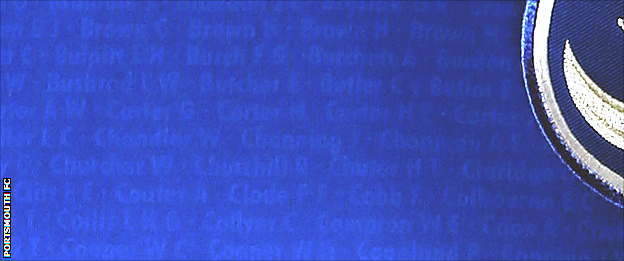
The names of the 1,400 Pompey Pals who fell during the Great War are woven into the new home shirt
A poster depicting secretary of state for war Lord Kitchener's pointing finger above the slogan 'Your Country Needs You' is one of the most iconic images from WW1. However, as Beech explains, it was Lord Derby who came up with the phrase 'Pals Battalion' during a speech in Liverpool. The Army recruited more than 100,000 men in a month and altogether 144 different Pals Battalions, including the two from Portsmouth, were formed and trained in Aldershot.
"The idea behind it was that you would serve with your brother, your cousin, your friends or people you worked with and socialised with," added Beech. "Now we know the folly of that. These new armies, as they were known, were tested out at the Battle of the Somme in 1916.
"The Pompey Pals first went 'over the top' on 3 September 1916 with horrific losses and next on 15 September when they suffered equally as horrific losses."
There is a now a permanent memorial to 'the Pals' at Fratton Park. They will never be forgotten.
The Football Battalion
The Football Battalion was the 17th Service Battalion of the Middlesex Regiment. Among its ranks was Captain Edward Bell MC, an outside forward and former schoolteacher, who played for Southampton and Portsmouth.
The Battalion was formed at Fulham Town Hall in December 1914 and consisted of professional and amateur footballers - plus some supporters. It included players from Portsmouth, Crystal Palace and Chelsea.
The Battle of the Somme |
|---|
The Battle of the Somme began on 1 July 1916 and claimed the biggest loss of soldiers in a single day of fighting ever recorded by the British army. |
Approximately 60,000 men were killed or wounded by the end of the first day. |
Many 'Pals Battalions' suffered catastrophic losses: whole units died together and for weeks after the initial assault, local newspapers would be filled with lists of dead, wounded and missing. |
By the time the 'Great Push' was called off on 18 November 1916 the British had suffered about 420,000 casualties, the French about 200,000 and the Germans about 650,000. |
It left for the War after training in 1915 and played a number of matches as well as fighting the enemy. By the end of the conflict the regiment had lost more than 1,000 men - including Bell, who is remembered at Fratton Park with a plaque in his honour.
"He is one of our own," explained Beech. "Too long has gone by without him being recognised so it is only fair and fitting that there is a permanent memorial to him at Fratton Park.
"He was a footballer and a man who laid down his life for our country. He is no different to the other 800,000 or so people who died but he is one of our own and his legacy will always be remembered by Portsmouth Football Club."
In 1916 Bell received the Military Cross after rescuing several men from a blown-in dugout. He was killed by a shell at the Second Battle of the Somme on 24 March 1918.
Portsmouth - home of the navy
Portsmouth Naval Base has been an integral part of the city since 1194. According to the Royal Navy website,, external the city is 'home to almost two-thirds of the Royal Navy's surface ships. The base is also a major employer and provides lodging facilities to RN personnel serving at the base and in Portsmouth-based ships'.
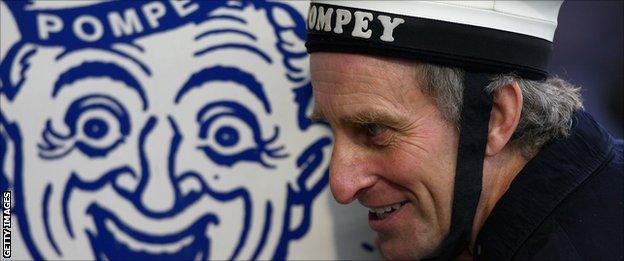
Portsmouth's mascot represents the city's links with the navy
Battleship HMS Royal Sovereign was launched from Portsmouth in 1915, while numerous submarines also left the city.
And the importance of the fixture is not lost on Pompey manager Andy Awford, who will lay a wreath on behalf of the club at Sunday morning's remembrance service at Portsmouth Guildhall.
"We can't forget those people and it's really important we remember them on Sunday," Awford told BBC Radio Solent. "We've got a great tradition here between the city and the War and we'll respect it properly, do it the right way and show our respect."
More than 6,000 people from Portsmouth were killed, external during WW1 and a further 18,000 wounded.
Wearing Army colours
Land in Aldershot was bought by the British Government to establish an army camp in 1854 and the size of the garrison in the north-east Hampshire town quickly increased during the course of the Crimean War.
Aldershot was the largest and most important army camp in Britain by the time WW1 began.
The town the BEF left behind in August 1914 then became a vast training centre, which doubled in size from its pre-war strength.
Shots boss on army town v naval base |
|---|
"The connections make it very poignant," said Shots boss Andy Scott. "It's a fitting tribute on the 100th anniversary of World War One and we can mark it in the correct fashion on such an important day. |
"We want to make everybody proud of the fact we are representing Aldershot and the Army, and Portsmouth will be doing so with the navy. Hopefully that will reflect on the day." |
Aldershot's football club was not formed until 1926, eight years after the end of the conflict.
However the old Aldershot FC, who were liquidated in 1992, enjoyed strong links with the British army.
Aldershot Town, the phoenix club formed shortly afterwards, have continued that tradition.
"The club colours are blue and red, which are the military colours if you go back to the early days; red for the infantry and blue for the cavalry," Colonel Charlie Lambert, the commander at Aldershot Garrison, told BBC Surrey.
"They still wear our colours and fly our flag in the corner of the pitch."
Rebuilding links
One hundred years on from the Great War, Aldershot Garrison is seen as the 'historical home' of the Army and is still a major base; covering almost 500 hectares and with a population of about 10,500.
Aldershot Town have endured a turbulent couple of years on and off the pitch, going into administration shortly after their relegation from the Football League in 2013.
However, the consortium that eventually took over the Shots, which includes chairman Shahid Azeem and director Tony Knights - who spent 23 years in the Army, are keen to re-establish a relationship with the garrison.
"The local people of Aldershot tell me they are hugely supportive of the military and like the fact it is the historic home of the British army," Col Lambert said.
"We have rebuilt some very strong links with Shahid and his team over the last few years. They have been supportive of us and everything we do, and in turn we are doing the best we can to support the club.
"When we get free tickets from the club they are gobbled up."
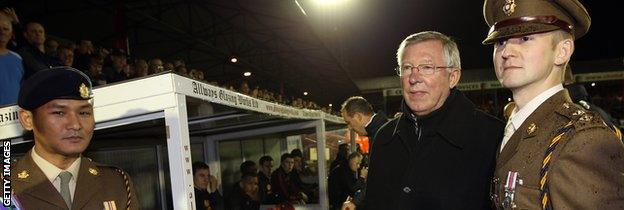
Aldershot Town have previously given tickets to the Army - including for the visit of Manchester United in the fourth round of the League Cup in October 2011
A time to remember
Remembrance Sunday provides a chance to reflect on the great sacrifice that servicemen have made in the line of duty for their country, but the occasion has extra significance this year given the centenary of WW1.
The installation of 888,246 ceramic poppies at the Tower of London has captured the public's imagination, with each individual poppy representing a British military fatality during the course of WW1.
"My grandfather fought in the First World War and my father fought in the Second World War," Col Lambert said.
"I've been in the Army since 1984 and have served in a number of different places. Remembrance Sunday is a huge occasion to remember all the fallen since the First World War and beyond."
Shots director Knights describes Remembrance Sunday as "quite an emotional time", given the connections he and his family have to the military.
"I look at the Chelsea Pensioners in admiration," he said.
"A lot of people won't make the game this weekend because the remembrance does take over the game of football."
Remembrance Sunday will be marked by a pre-match ceremony at Fratton Park and Portsmouth and Aldershot - the navy base and the army garrison - will celebrate their links, and remember, together.
- Published4 August 2014
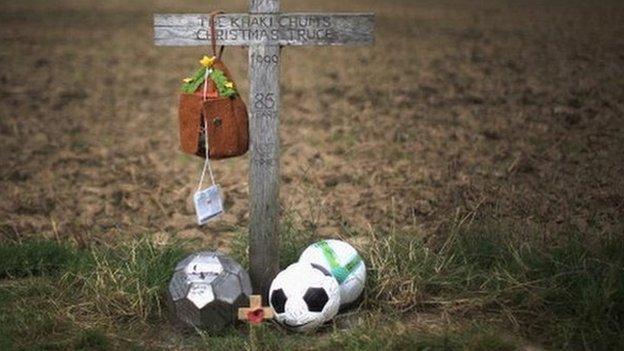
- Published4 August 2014
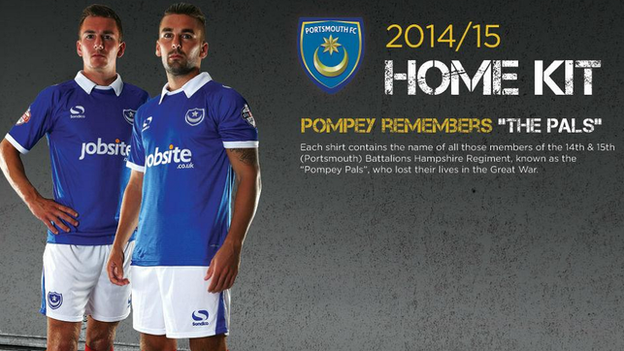
- Published6 November 2014
